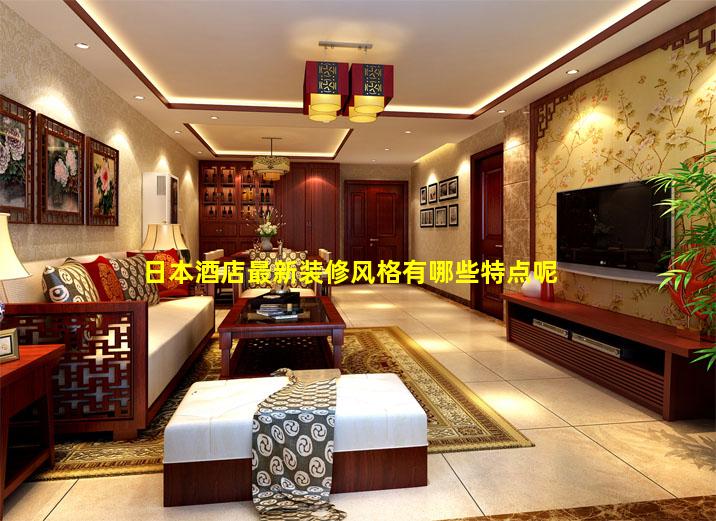一、日本酒店最新装修风格有哪些特点呢
日本酒店最新装修风格的特点:
1. 极简主义:
简洁的线条和中性色调
强调自然光和空间感
减少杂物和装饰
2. 自然元素:
使用木材、石头、竹子等天然材料
引入植物和水景
营造宁静和放松的氛围
3. 传统元素:
融入日本传统元素,如榻榻米、障子门、和纸
创造一种文化沉浸感
尊重日本美学
4. 智能技术:
无钥匙进入、语音控制、自动窗帘
提升便利性和舒适度
创造无缝的入住体验
5. 可持续性:
使用环保材料和节能设备
减少浪费和碳足迹
促进可持续旅游
6. 个性化:
迎合不同客人的需求和偏好
提供定制化服务和设施
创造独特的和难忘的体验
7. 舒适性:
舒适的床铺、豪华的床上用品
宽敞的浴室和便利设施
营造一个温馨和放松的氛围
8. 体验式:
提供文化体验,如茶道、书法
举办活动和工作坊
创造一个互动和难忘的住宿
9. 禅宗美学:
强调平衡、和谐和宁静
使用自然元素和柔和的色调
营造一个冥想和放松的空间
10. 现代感:
结合传统元素和现代设计
使用时尚的家具和装饰
创造一个既舒适又时尚的空间
二、日本酒店最新装修风格有哪些特点呢图片
日本酒店最新装修风格特点
1. 极简主义
干净利落的线条
中性色调,如白色、黑色和灰色
天然材料,如木材和石头
强调功能性和空间利用率
2. 和风元素
传统日式元素,如榻榻米、障子纸和木格栅
自然元素,如竹子、石头和水景
营造宁静和禅意的氛围
3. 现代工业风
裸露的砖墙、混凝土和金属
大窗户和高天花板
强调工业美学和实用性
4. 北欧风
明亮通风的空间
浅色木质家具
舒适的纺织品和毛毯
营造温馨和舒适的氛围
5. 侘寂风
强调不完美和无常
使用天然材料,如未经处理的木材和石头
营造一种质朴和禅意的氛围
图片示例:[图片 1:极简主义风格的酒店房间,白色墙壁、木质家具和落地窗]()
[图片 2:和风元素风格的酒店房间,榻榻米地板、障子纸门和木格栅]()
[图片 3:现代工业风风格的酒店房间,裸露的砖墙、混凝土天花板和金属家具]()
[图片 4:北欧风风格的酒店房间,浅色木质家具、舒适的纺织品和落地窗]()
[图片 5:侘寂风风格的酒店房间,未经处理的木材、石头和质朴的装饰]()

三、日本酒店最新装修风格有哪些特点呢英语
Characteristics of the Latest Hotel Renovation Styles in Japan
1. Incorporation of Japanese Elements:
Traditional Japanese aesthetics, such as shoji screens, tatami mats, and natural wood, are seamlessly integrated into modern designs.
Zeninspired principles of simplicity, minimalism, and harmony are evident in the use of clean lines, open spaces, and natural materials.
2. Emphasis on Comfort and Functionality:
Guest rooms are designed to provide maximum comfort and convenience, with ergonomic furniture, highquality bedding, and advanced technology.
Public spaces are spacious and inviting, offering areas for relaxation, socialization, and work.
3. Use of Sustainable Materials:
Hotels are increasingly adopting ecofriendly practices by incorporating sustainable materials into their renovations.
This includes using recycled wood, bamboo, and other renewable resources, as well as energyefficient lighting and appliances.
4. Integration of Technology:
Smart technology is seamlessly integrated into guest rooms and public areas, enhancing convenience and personalization.
Features such as voiceactivated controls, mobile checkin, and digital concierge services are becoming increasingly common.
5. Experiential Design:
Hotels are creating immersive and memorable experiences for guests through unique design elements and interactive installations.
This includes incorporating local art, cultural displays, and interactive exhibits that showcase the destination's history and culture.
6. Emphasis on Wellness:
Hotels are recognizing the importance of guest wellbeing and incorporating wellnessoriented amenities into their renovations.
This includes fitness centers, yoga studios, and spa treatments, as well as healthy dining options and air purification systems.
7. Customization and Personalization:
Hotels are offering guests the ability to customize their stays by providing a range of room types, amenities, and services.
This includes personalized room preferences, tailored dining experiences, and exclusive access to amenities and activities.
四、日本酒店最新装修风格有哪些特点呢英文
Characteristics of the Latest Hotel Renovation Styles in Japan
Minimalism and Simplicity: Japanese hotels are renowned for their minimalist aesthetic, characterized by clean lines, neutral colors, and a focus on natural materials such as wood and stone. This simplicity creates a sense of tranquility and spaciousness.
Integration of Nature: Japanese design emphasizes the connection between humans and nature. Hotels often incorporate elements of the surrounding environment into their interiors, such as natural light, greenery, and water features. This creates a harmonious and relaxing atmosphere.
Traditional Elements: While embracing modern design, many Japanese hotels also incorporate traditional elements to preserve their cultural heritage. This may include tatami flooring, shoji screens, and Japanesestyle furniture.
Technology and Innovation: Japanese hotels are at the forefront of technological advancements. They often feature smart amenities such as voiceactivated controls, automated checkin systems, and highspeed internet.
Personalized Experiences: Japanese hotels prioritize personalized experiences for their guests. They offer tailored services, such as customized room amenities, exclusive dining options, and curated activities.
Sustainability: Japanese hotels are increasingly adopting sustainable practices. They use ecofriendly materials, reduce energy consumption, and promote waste reduction.
ZenInspired Spaces: Many Japanese hotels incorporate Zen principles into their design. This includes creating calming and meditative spaces with natural elements, soft lighting, and soothing colors.
Multifunctional Spaces: Japanese hotels often feature multifunctional spaces that can be used for various purposes. This allows guests to maximize their space and create a more flexible and comfortable environment.
Attention to Detail: Japanese hotels are known for their meticulous attention to detail. Every aspect of the design, from the lighting to the furniture, is carefully considered to create a harmonious and aesthetically pleasing experience.
Cultural Immersion: Japanese hotels provide guests with opportunities to immerse themselves in Japanese culture. They may offer traditional tea ceremonies, calligraphy classes, or guided tours of nearby historical sites.


.jpg)
.jpg)
.jpg)
.jpg)
.jpg)
.jpg)